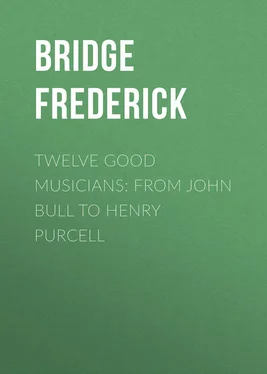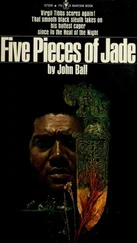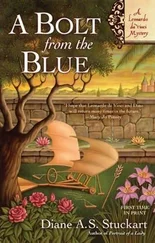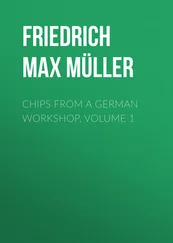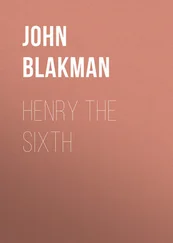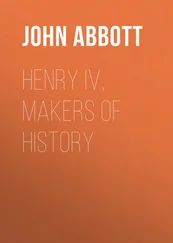Frederick Bridge - Twelve Good Musicians - From John Bull to Henry Purcell
Здесь есть возможность читать онлайн «Frederick Bridge - Twelve Good Musicians - From John Bull to Henry Purcell» — ознакомительный отрывок электронной книги совершенно бесплатно, а после прочтения отрывка купить полную версию. В некоторых случаях можно слушать аудио, скачать через торрент в формате fb2 и присутствует краткое содержание. Жанр: foreign_language, foreign_antique, foreign_prose, на английском языке. Описание произведения, (предисловие) а так же отзывы посетителей доступны на портале библиотеки ЛибКат.
- Название:Twelve Good Musicians: From John Bull to Henry Purcell
- Автор:
- Жанр:
- Год:неизвестен
- ISBN:нет данных
- Рейтинг книги:3 / 5. Голосов: 1
-
Избранное:Добавить в избранное
- Отзывы:
-
Ваша оценка:
- 60
- 1
- 2
- 3
- 4
- 5
Twelve Good Musicians: From John Bull to Henry Purcell: краткое содержание, описание и аннотация
Предлагаем к чтению аннотацию, описание, краткое содержание или предисловие (зависит от того, что написал сам автор книги «Twelve Good Musicians: From John Bull to Henry Purcell»). Если вы не нашли необходимую информацию о книге — напишите в комментариях, мы постараемся отыскать её.
Twelve Good Musicians: From John Bull to Henry Purcell — читать онлайн ознакомительный отрывок
Ниже представлен текст книги, разбитый по страницам. Система сохранения места последней прочитанной страницы, позволяет с удобством читать онлайн бесплатно книгу «Twelve Good Musicians: From John Bull to Henry Purcell», без необходимости каждый раз заново искать на чём Вы остановились. Поставьте закладку, и сможете в любой момент перейти на страницу, на которой закончили чтение.
Интервал:
Закладка:
Of late years much attention has been devoted to Byrd's sacred music, which includes some remarkably fine Masses, some of which have been reprinted and used in the Roman Catholic Church. But Byrd has never been forgotten in the Cathedrals of England, for his Anthem Bow Thine ear has always found a place in the lists of the daily musical services. There is, also, a fine specimen of his composition in the volume of Cathedral music published by Dr. Hayes. It has English words, and for a long time appeared in the Abbey list as by Hayes, but it was identified as one of Byrd's Latin motets, and now is ascribed to the rightful owner.
An interesting specimen of his Clavier compositions is to be found in the Fitzwilliam volume being an arrangement of the air O Mistress Mine . This is one of the few pieces of Shakesperean music which was published in the Poet's life-time. It is charmingly treated by Byrd. The same air appeared in a work by Morley, an arrangement of various airs for a small Band consisting of the Treble Viol, Flute, Cittern, Pandora, Lute, and Bass Viol. It seems probable that this air was a popular tune and that Shakespeare wrote words to it, or possibly (as he did in Willo! Willo! ) took the old words which were set to the melody and incorporated them in his play.
A contemporary opinion of Byrd can be gathered from Peacham's estimate of him in the Compleat Gentleman . Writing in 1622, he says: "In Motets and Musicks of piety and devotion, as well for the honour of our nation as the merit of the man, I preferre above all other our Phoenix, Mr. Wm. Byrd, whom, in that kind, I know not whether any may equall, I am sure none excell, even by the judgment of France and Italy. His Cantiones Sacrae and also his Gradualia are meere Angelicall and Divine and being himself naturally disposed to gravity and piety, his veine is not so much for light Madrigals and Canzonets, yet his Virginella and some others in his first set cannot be mended by the best Italian of them all." And Morley speaks of him as "my loving master, never without reuerence to be named of Musicians."
His name has always been associated with the Canon Non nobis Domine , but it would be very difficult to establish his claim to the authorship.
Altogether the old musician has a remarkable list of varied compositions to his credit. Besides those already mentioned he wrote some excellent Fancies and In Nomines for strings, making a real advance upon the somewhat stilted specimens of Instrumental Music then in vogue, and helping to free the Instrumental form of composition from the vocal. Fancies and In Nomines I shall speak of in detail in a later lecture.
William Byrd had a long and honourable career and contributed in a remarkable degree to the development of the Art of Music in England in the 17th century. There is much truth in Peacham's verdict that his music "cannot be mended by the best Italian of them all."
III. THOMAS MORLEY
The next of our twelve musicians in chronological order of birth is Thomas Morley, born in 1557, when Byrd was a young man, though his course was run long before that veteran had finished with the affairs of this world. He was a pupil of Byrd, and was probably a chorister of St Paul's Cathedral. In 1588 he graduated B.Mus. at Oxford, and some three years later was appointed Organist of St Paul's. This position he did, however, not hold long, as in 1592, he was appointed a Gentleman of the Chapel Royal. In 1598 he was granted the licence, which had previously been held by Tallis and Byrd, for the exclusive right of printing and selling Books of Music and Ruled Paper, and many of the musical works which were published at that time were issued by Este, Peter Short, William Barley, and others, as the assigns of Thomas Morley. In 1602 he resigned his positions at the Chapel Royal, probably from ill-health, as one gathers from the Introduction to his Plaine and Easie Introduction to Practical Music that he was rather a confirmed invalid. Some have taken the year of his resignation as that of his death, but there is nothing to support this, and though Hawkins and Burney are at one in placing his death in 1604, the correct date is 1603.
Details of Morley's life are scanty, by his works we must know him. His compositions are both vocal and instrumental, sacred and secular; and, in addition to his work in the various branches of composition, much of his fame rests upon his authorship of the first really satisfactory treatise on music, The Plaine and Easie Introduction already referred to.
This work is full of interest, and has been a book of reference and of valuable information to musicians for the past three centuries. Written in the form of a dialogue between Master and Pupil, it contains many quaint discourses, and it is in the early chapters of this work that the story is told of the unfortunate gentleman who could not read music at sight when asked to do so by his hostess, with the humiliating result that the company wondered "where he had been brought up."
Morley's book was translated into German by I. C. Frost, Organist of St Martin's, Halberstadt. It is interesting to observe that more than one of his works was translated into German (e.g., the Canzonets or Little Short Songs to Three Voyces , published here first in 1593, was translated into German and issued at Cassel in 1612 and at Rostock in 1624; and the Ballets for Five Voyces of 1595 was issued at Nuremberg in 1609).
This is a striking testimony to his merits, but the most celebrated of his publications was the great edition of Madrigals called The Triumphs of Oriana . This is said to have been compiled as a tribute to Queen Elizabeth, whose title of "Gloriana" is well known. In this portly volume he includes no fewer than twenty-six Madrigals, contributed by many of the most famous living English composers. The work helped to make the practice of Madrigal-singing very popular in England, and to this day its influence is great and few programmes of Madrigal-music are ever issued without some specimen taken from this splendid collection.
And it is to Morley we owe a delightful contemporary setting of words by Shakespeare – the beautiful Lyric "It was a lover and his lass" from As You Like It . This is one of the very few things which we possess – with the words by Shakespeare and the music by a contemporary musician. Unfortunately, the charming song has been often sadly mutilated by editors, sometimes by the introduction of unwarranted "accidentals" and also by actual curtailment. I have, however, had the opportunity of referring to one of the few copies in existence of the original publication (formerly in the Halliwell-Phillip's collection), and have so been enabled to issue it in its correct form. Various attempts have been made to arrange it as a duet, on the ground that it was sung in the play by "two pages." The dialogue which precedes the song is very amusing and rather suggests that Shakespeare had some little experience of the peculiar weaknesses of singers, both amateur and professional. The following is the little episode in question:
1st Page: Well met, honest gentleman. Touchstone: By my troth, well met. Come sit, sit and a song.
2nd Page: We are for you: sit i' the middle.
1st Page: Shall we clap into't roundly, without hawking or spitting or saying we are hoarse; which are the only prologues to a bad voice?
2nd Page: I'faith, i'faith; and both in a tune, like two gipsies on a horse.
As You Like It , Act V., scene 3.
The words "two gipsies on a horse" have been taken to suggest that as the two gipsies must have ridden one behind the other, the two pages should sing, not in unison, but one after the other. Hence the effort to arrange the music in Canon, as it is termed. But there is no warrant for this; neither will the song admit of it. 4 4 Mr Arkwright gives us an interesting bit of information in connection with Morley and Shakespeare. "Morley lived in St Peter's, Bishopsgate, between 1596 and 1601, and his name appears in two Rolls of Assessments for Subsidies . In the earlier of these documents is the name of William Shakespeare, his goods being valued at the same amount as Morley's. He and Shakespeare both appealed against the assessment, and it may be supposed some amount of personal intercourse existed between them."
Интервал:
Закладка:
Похожие книги на «Twelve Good Musicians: From John Bull to Henry Purcell»
Представляем Вашему вниманию похожие книги на «Twelve Good Musicians: From John Bull to Henry Purcell» списком для выбора. Мы отобрали схожую по названию и смыслу литературу в надежде предоставить читателям больше вариантов отыскать новые, интересные, ещё непрочитанные произведения.
Обсуждение, отзывы о книге «Twelve Good Musicians: From John Bull to Henry Purcell» и просто собственные мнения читателей. Оставьте ваши комментарии, напишите, что Вы думаете о произведении, его смысле или главных героях. Укажите что конкретно понравилось, а что нет, и почему Вы так считаете.
